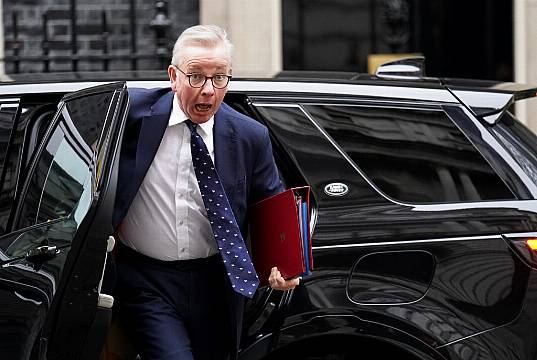A climbdown over housing targets in the face of a mass revolt by Tory MPs makes the British government look “strong”, Michael Gove claimed.
The government has watered down local housebuilding targets to avoid the first major Commons rebellion of Rishi Sunak’s premiership.
Labour accused Mr Sunak of being “weak” but Britain's housing secretary Mr Gove insisted the government was delivering on the promised reforms to the planning system to make sure new homes were built.
“I think it makes the government look strong because we are delivering on the planning reform that we promised a year ago,” he told the BBC.

“When I arrived here I said that we wanted to have a planning system that put beauty and local democracy at the heart of our planning system, that is what we have got now thanks to close engagement with MPs who really care about getting the right homes in the right places.”
In a letter to MPs on Monday, Mr Gove said the Levelling-up and Regeneration Bill would be amended to abolish local mandatory housebuilding targets.
Mr Gove said he recognises “there is no truly objective way of calculating how many new homes are needed in an area” but that the “plan making process for housing has to start with a number”.
The change would make the centrally determined target a “starting point”, with councils able to propose building fewer homes if they faced “genuine constraints” or would have to build at a density that would “significantly change the character” of their area.

The Bill is expected to return to the Commons next week for day two of its report stage.
The decision represents a victory for a group of Tory backbenchers led by Conservative former cabinet minister Theresa Villiers and Conservative MP Bob Seely, who had proposed a series of amendments to the government’s flagship Bill that would have meant sweeping changes to the planning system.
Around 60 MPs had signed an amendment that would have scrapped mandatory housing targets and the requirement for councils to demonstrate a five-year supply of housing land.
Supporters of the proposal said this would protect the environment and ensure communities were not forced to accept unwelcome development.
But some Conservatives were critical of the proposal, with 2019 Tory manifesto co-author Robert Colville saying it would “enshrine ‘nimbyism’ as the governing principle of British society”.
Welcoming Mr Gove’s announcement, Ms Villiers said the government had “listened” and the reforms would “rebalance the planning system and give local communities a greater say over what is built in their neighbourhood”.
She added: “The compromise we have secured shows that positive change can be achieved through backbench scrutiny of legislation.”
Isle of Wight MP Mr Seely said that “well over 100 Tory MPs” had supported the changes, which would make the government’s housing and planning agenda “more conservative than the one we currently have”.
He said: “The new language we’ve agreed will work with communities, speaking to the character of areas and celebrating the beauty of good design. It understands the need for farmland, will significantly emphasise brownfield over greenfield development and will help deliver homes for young people.”
Labour’s Lisa Nandy strongly criticised the government’s decision, describing it as “unconscionable in the middle of a housing crisis”.
The shadow communities secretary said: “We offered Labour votes to defeat the rebels, but Rishi Sunak and Michael Gove seem to have chosen party before country.
“This is so weak. In office but not in power.”
Other changes agreed to by Mr Gove include charging a higher infrastructure levy on greenfield development, taking action to prevent land banking, and ending the “duty to cooperate” which sees rural and suburban areas required to help meet the housing need of neighbouring cities.
In the letter, Mr Gove said the government would be “investing more homes in the North and the Midlands to relieve pressure on the South.”
The government has also promised to consult on requiring planning permission before residential property can be let out on websites such as Airbnb.







